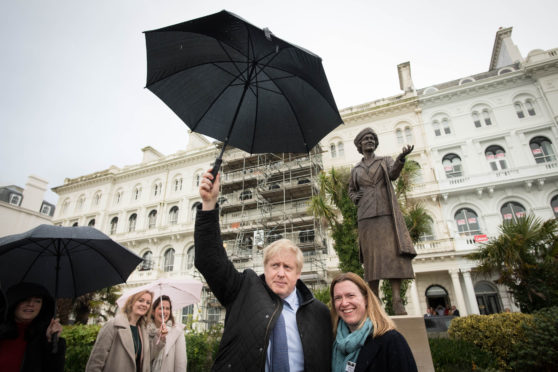Come to our Christmas shindig, they said. Well how could I refuse?
But it turns out the sort of policy wonks I spend too much of my time with at Westminster don’t share my vision of what constitutes a shindig.
Theirs featured a professor, a peer and a pointy-head pontificating on the year just gone. Two of them were female so they didn’t constitute three wise men. But the event did take place at London university King’s.
But if Christmas is about giving thanks – either for Jesus or for a new Amazon Alexa depending on your approach to the festivities – then this one worked a treat.
For these experts were talking about serious issues. The ones that will really shape the nation’s future. The ones that the politicians are resolutely ignoring as much as possible during the election campaign.
First up was Brexit. Professor Sir John Curtice told me recently that this is a Brexit election. And yet there has been precious little proper discussion about this overarching issue. The UK in a Changing Europe think tank wrote off the parties’ promises on Brexit in a report published yesterday as “unclear, unfeasible, misleading or missing”.
‘Get Brexit done’ is not a policy. And Labour can’t even boil their approach down to a snappy slogan. But it adds up to Labour’s team leading an unlikely negotiation for a mysterious new deal and then Jeremy Corbyn refusing to say if he thinks it’s any cop or not. Whatever that is, it’s process not substance.
How we leave the EU should not be the sum total of the discussion. It should be the backdrop and the catalyst to a national debate about why we are leaving the EU and what we’ll do once we’re out.
If the answer is ‘Get lots of trade deals’ that betrays the utter paucity of imagination among our political class.
If, as now seems increasingly likely, Brexit is to take place, it is an opportunity to re-imagine Britain’s place in the world and fundamentally reset the culture. That might mean we’re a low regulation trading nation, an economic buccaneer with all the cut-throat elements that go with that term. Or it may mean we are beacons of governmental virtue, spending our EU membership fees instead on social justice and showing how a nation can look after its most vulnerable.
But buccaneers or beacons, let’s have the debate.
The next topic was pensions. Again, radio silence from the politicians except for Labour’s decision to pay out to the Waspi women who complain they’ve been diddled out of the cash they’re due. The courts dismissed their case but apparently Judge Jeremy knows better.
The population is ageing. Funding social care is one aspect of that phenomenon (albeit one already answered in Scotland). But there are bigger questions about how the state will pay for anything as the demographic balance gets all out of whack. One in five youngsters apparently suspect there’ll be no state pension by the time they hit retirement age. If that key element of the social contract frays then there will be precious little to bind the nation bar rooting for Andy Murray at Wimbledon for a few weeks every summer. And he can’t go on forever.
The final speaker covered gender.
Perhaps the most shocking aspect of this election campaign has been the marginalisation of women.
Only 20% of the coverage has featured female voices. Yet women will make up 50% of the electorate.
When Theresa May unveiled a statue of Lady Astor in Plymouth last week she not only hiked the visibility of women in this campaign she highlighted how far we have to go. The PM promised 50% of his candidates would be women. Next time. When it comes to gender equality it’s always next time. Which is why a century on from Astor taking her seat, the first woman to do so, two privileged and by any standard inept men are battling to lead a parliament that will be at best around one third female.
The treatment of Jo Swinson is typical. She hasn’t set the heather alight this election. But there’s little doubt much of the opprobrium and downright anger she’s dealt is fuelled by misogyny. She’s routinely dismissed as too much of a head mistress or a head girl. Anyone who’s recently set foot inside the inevitable chaos that is a secondary school would not only revere the talents of head teachers but quite possible wish more of them in Westminster. A few exclusions, detentions and exhortations to buck up their ideas inflicted on the political class would be welcome. But Swinson started at a disadvantage because she’s female. A recent poll in the US found around half of men there admitted to being uncomfortable with the idea of a female president. The idea that British men are significantly more open minded seems a stretch.
We need big ideas on gender equality, demographics and Brexit.
But our Westminster politicians prefer a ding dong over who is the most racist.
Perhaps an election campaign is not the time to expect really big issues to be up for discussion. But it ought to be.
This Christmas thank heaven there are academics and experts out there having big thoughts beyond how to win a handful of votes in swing seats. We’re going to need them after election day.
James Millar is a political commentator and author and a former Westminster correspondent for The Sunday Post











